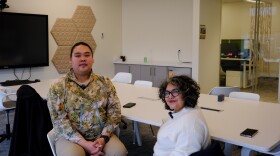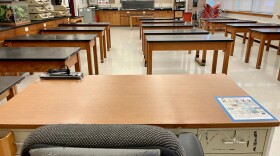-
The Alaska Institute for Justice launched the resource early, to help people affected by the recent Western Alaska storm.
-
It's not easy to accept 70 new students in the middle of the school year, but College Gate Elementary School in Anchorage welcomed a group of children, forced to relocate to Anchorage, after hurricane-force winds and flooding devastated coastal communities in Western Alaska.
-
Bethel’s museum of Yup’ik, Cup’ik, and Dene artifacts has reopened after being closed for years.
-
Tribes from the Bering Sea isle say they’re living — and dying— with the toxic legacy of Cold War military installations. A U.N. special rapporteur is considering their case.
-
In November, the partial remains of four Yup’ik inhabitants of the Bethel area were finally laid to rest by the Orutsararmiut Traditional Native Council (ONC). The remains had been stored at the University of Pennsylvania Museum of Archaeology and Anthropology for more than a century.
-
Historical sites across Western Alaska face existential threats, and the lead archaeologist for the Nunalleq excavation says its success is a stark reminder that it may not be long before many more precontact Yup’ik sites are lost forever.
-
It is now up to the board and Gov. Mike Dunleavy to decide whether or not to implement the new standards, which would allow Alaska Native languages to satisfy the state’s reading requirements.
-
In dozens of publications, Marie Meade, Ann Fienup-Riordan, and Alice Rearden have established themselves as tours de force documenting first-hand accounts of Elders across the Yukon-Kuskokwim Delta.
-
The Bethel robotics team’s translation project connects people to the meaning of Yup’ik songs and dances, whether it’s their first time hearing the music or they grew up with yuraq.
-
Byron Nicholai's new album, Ayagnera, was released in March. The songs, in Yugtun, are a mash up of the Toksook Bay artist's emotions and his varied interest in different kinds of mix. He says the Yup'ik drum and traditional dancing helped inspire the album.

Play Live Radio
Next Up:
0:00
0:00
Available On Air Stations










